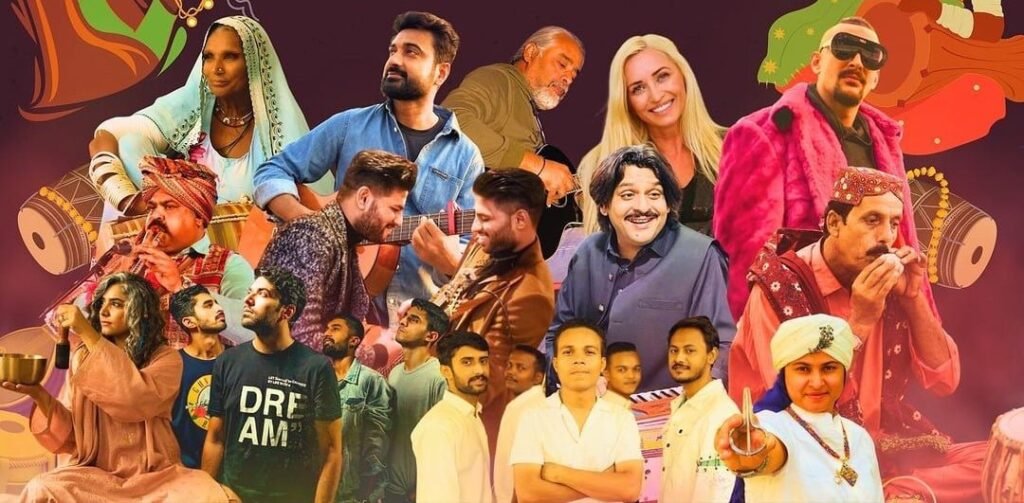As it enters its 11th edition this year, Lahooti Melo is ready to solidify its status as a cultural space devoted to conversations and art around ecology and indigeneity. Founded by Sketches frontman Saif Samejo and his wife Sana Khoja, Lahooti Melo is now leaving its mark on cities like Hyderabad, Jamshoro, Karachi, and most recently, Sukkur. In an exclusive interview with The Express Tribune, the founders reflected on the festival’s long journey.
“Festivals are a living thing. Just like any living thing, festivals also evolve. From Jamshoro to Hyderabad, then to Karachi, we’ve been taking Lahooti to different cities. Last year, we held the fest in Sukkur,” Saif remarked. Understanding Lahooti’s impact, the musician pointed out how the grassroots fest has become a catalyst for inspiring similar initiatives, from events hosted by the Arts Council of Pakistan to those by the Sindh Culture Department.
Slated to return this year in Hyderabad’s historic Rani Bagh on January 20, Lahooti Melo is expected to charm audiences with an impressive lineup of musicians, comedians, and other artists. From Faris Shafi to Mai Dhai and Sketches themselves, the one-day festival that will hit Sukkur on February 17, has garnered widespread anticipation.
It is not uncommon to introduce new avenues of entertainment and cultural dialogue. However, to turn such an event into a sustainable space is the real feat. Aside from the founding couple’s dedicated efforts, they believe their festival’s longevity is made possible by some reality checks.
“Being a grassroots festival, your desires are small and expectations are few, but your intention is very visible,” Saif attributed Lahooti’s success to its community-based origins. “Whenever we call an artist from a city, a village or another country, we are very clear about our intention of what we are doing on the ground. We don’t have any big promises. We are a very simple festival that promotes music.”
Heralding the hashtag #EconotEgo as its motto, Lahooti Melo has nailed down a major thesis of all climate change activism – humbling the human. According to Sana, to talk ecology is to attend to life as a web of relations where humans are just one facet. Subsequently, it is necessary to appreciate the festival as straddling multiple economies of struggling musicians and bureaucratic actors. “Our society has a lot of musicians who are not formally employed. This was our understanding because we used to travel a lot for Lahooti sessions to approach musicians, storytellers and poets.”
Having experienced the tough market for artists firsthand, Saif explained how many in the field are discouraged from pursuing their generational music due to financial constraints. But what intervention could Lahooti Melo make? As per the founders, this recognition paved the way to onboard policymakers. “We realised that if we are politically aware and connected through our festivals, why don’t we bring in a policymaker?” Saif described the thought process.
The result was an open collaboration between the provincial education and culture departments, led by Lahooti to introduce music as a primary curriculum subject in government schools, instead of an extra-curricular activity. “Thousands of musicians got employed as teachers,” Saif underlined how a serious festival can simultaneously platform change and sustain itself.
The fest returns every year with a new climate-related cause to amplify that sets the edition’s theme. This year, Lahooti Melo has designated Karoonjhar, a mineral-rich mountain range in Tharparkar, as its critical cause as faces a detrimental mining and excavation project.
“Unlike other festivals or events, it’s not a two-day event for us that we return to every year. We work on it throughout the year,” Sana added, elaborating on the many conversations on Karoonjhar Mountains that preceded the threatened site from becoming this year’s theme. “The government should also be told to think of alternatives. The solution is not cutting down mountains.”
Stressing the need for sustainable solutions, Saif insisted that it is easy to misunderstand the responsibility that befalls community activists and artists. “So, there are two aspects of doing it. One is that the purpose of your festival is to create awareness. So, this is the biggest objective, that you are creating awareness at that time.”
On the other hand, Saif contended, are practical measures taken when hosting a festival. Discouraging the use of plastics and maintaining solid waste management are some ways this pans out. “But these are also the things that we understand are an individual’s responsibility. And we hold our sessions on creating this awareness. Because any form of art can help in resistance.”
Saif explained how crucial it is to understand one’s limits in an undertaking such as Lahooti Melo. “We are not a moral police, that we can snatch plastic bottles from people, or that we can take their juices from their tetra packaging. We can’t do that. We can only tell them that there is an alternative to practice.”
In this vast landscape, Lahooti Melo situates itself as a politically conscious moderator. “When we talk about climate, we talk about our public spaces…we even revive public spaces. This time our festival is in Rani Bagh. So, there is a garden, an open space, which is available in Hyderabad, but it is not recognised in this way,” Sana expressed how such events also resuscitate forgotten public places.


